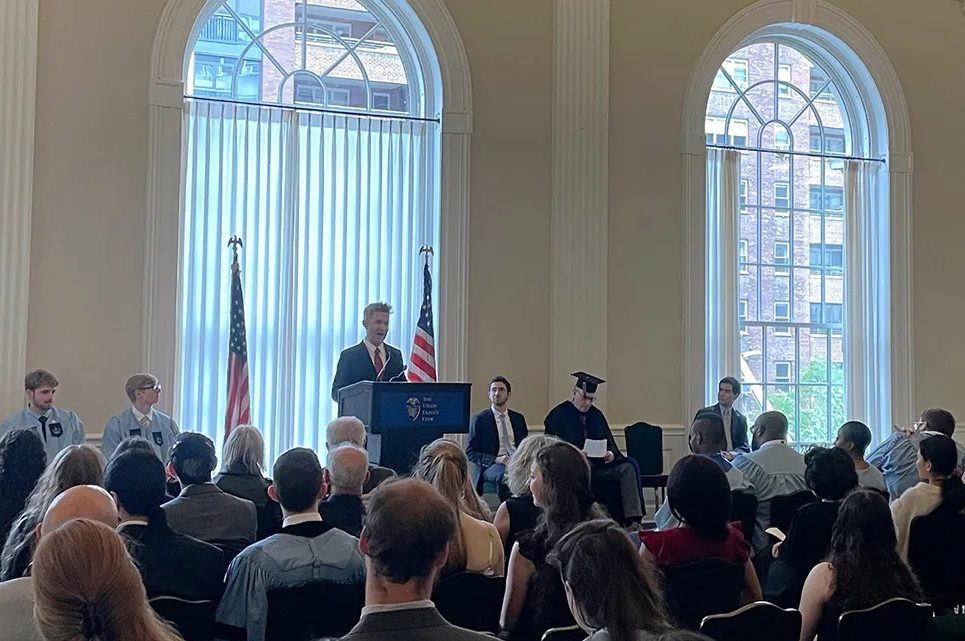There are several frustrating things about American college campuses, just one of which is the sheer volume of column inches they take up. Whenever an American campus has an “occupation” because the students want veto powers over foreign wars, the world media study their actions with great interest. Whenever a group of farmers or truckers complain about the loss of their livelihoods, whatever media attention does arrive comes from people eager to dismiss the protestors as know-nothings who are on to nothing.
I told them that while they may know something, the chances are that people older than them know more
Still, in recent months Columbia University in New York has distinguished itself with especially unpleasant scenes. Since Hamas attacked Israel last October, Columbia has gone insane. The students seemed positively eager for a great cause and found it in Hamas. One student told a journalist that since Columbia had “this massive history of protests,” he had to get stuck in. “I’m from a first-gen, low-income background. So I knew that if there was ever going to be an escalation, it was something I wanted to be a part of.” Another student who joined in explained that going to the early protests meant he “missed a lecture about literature and cultures of struggle in South Africa.”
In the middle of all this, Jewish students have been screamed at by protestors, invited to be the targets of Hamas’s next attack and been greeted with cries of “Go back to Poland.” The Columbia protestors have also been chanting “Glory to our martyrs” and “Globalize the intifada.” The university administrators came to realize that this was not a good look. As a result they arranged for the police to come in and clear away the illegal protest encampments.
;768:[300×250,336×280,320×100];0:[300×250,320×100,320×50]”]There is something especially pitiful about this. If you are hoping to study South African struggle literature at Columbia, you will pay an average of $66,000 a year, meaning you will come out a couple of hundred thousand dollars in debt. The less intelligent students seem to think that this money goes directly to Israel’s war effort. Quite how, they never explain. The more intelligent students might prefer to keep their heads down and hope to come out of Columbia with a qualification that will allow them to get a job to pay down that debt before they retire.
Unfortunately, as so often, the least sensible and least intelligent students make all the weather. So much so that this year’s commencement ceremony at Columbia (where students graduate in front of their proud families) was canceled. An example of actual collective punishment right there. The university’s leaders knew that any commencement would be a target of protest and that there would be scenes like those at other US campuses this month — such as at Duke University, where students left their own commencement ceremony in protest when the invited speaker turned out to be Jerry Seinfeld, who is apolitical but Jewish.
Then, last week, with not much notice, a group of Columbia students and faculty heard I was going to be in New York and invited me to speak at an alternative ceremony for the non-insane students and faculty. So one morning I agreed to speak, not far from the campus, to an audience of graduating students of every imaginable background. Speaking with them before and after, I noted how many of them were veterans or were conservative, Christian or Jewish. One young man explained that he had served in the US military, risked his life and lost friends defending the American flag, only to arrive at Columbia and discover that same flag was viewed as a hateful symbol. Wondering what I could possibly tell these students, I decided to take a constructive path. I decided to talk about four unpopular virtues which would set them up well in their lives.
The first was to respect tradition and wisdom. So many people tell young people (particularly at US commencement addresses) that they are the most important generation in history, uniquely wise and much more. I told them that while they may know something, the chances are that people older than them know more, and that they should listen to them and respect them.
I told them that they should try to orient their lives towards courage. While many of their contemporaries are desperate to climb the victimhood hierarchy, they should venerate people who have actually done something deserving of admiration. If they had already learned to swim against the tide of some of their more vitriolic contemporaries, then they might just be on that path already.
;768:[300×250,336×280,320×100];0:[300×250,320×100,320×50]”]I told them never to stop being curious and that the years at university aren’t the only ones in which intellectual discovery can happen. And I urged them to live lives of gratitude. If other people want to be tied up in lives of resentment, then so be it. They should be grateful for what they have and build on it, and if they did, the chances are they might make something for which their successors could be grateful in return.
Above all, I wanted to communicate to them something which is easily forgotten in our era of perma-doom. The devices we all have in our pockets obviously have the ability to completely derange us. But if we use them wisely, we have the opportunity to communicate, learn and problem-solve in ways our species never dreamed of. Today, wherever I go in the world, I find that the smart young people are on the same wavelength and onto the same problems, whether they are in New York, Sydney or Soweto. It means that the competition is greater than it’s ever been. But the opportunities are greater too.
I felt sorry for these students — that I was the one waving them off into the world. But they were filled with courtesy, eagerness, intelligence and gratitude. I suppose I might say that we ended up encouraging each other.
This article was originally published in The Spectator’s UK magazine. Subscribe to the World edition here.


























Leave a Reply